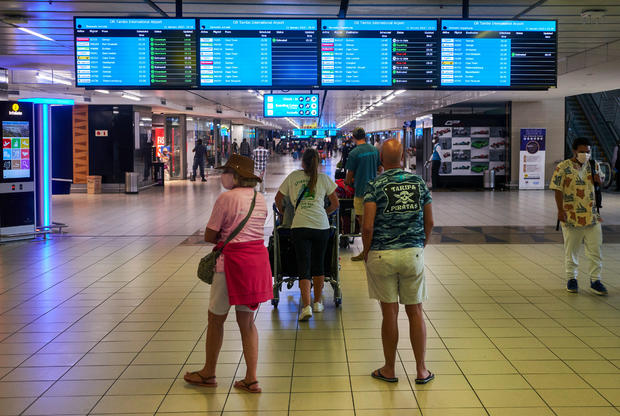South Africa is over Omicron, and their good news may be a harbinger of hope for the U.S.
Johannesburg — Only eight weeks after the world first heard about the Omicron variant of the coronavirus, when researchers in South Africa who discovered the strain notified global authorities, that country's wave of infections has fallen as sharply as it climbed. Not only that, but South Africa has weathered its fourth wave of COVID-19 with very little interruption to people's lives.
CBS News foreign correspondent Debora Patta reports that in the suburbs of Johannesburg, restaurants are busy again, traffic is jammed, and the city is bustling.
Omicron quickly became the focus of global anxiety as infections spread across South Africa with ferocious speed. Within days, the country was at the epicenter of the pandemic. And then… well, not much happened at all.
"A little bit at ease"
Patta and her team have monitored one COVID ward, at a hospital in Gauteng province, which includes the metropolis of Johannesburg and the capital Pretoria, throughout the pandemic. Six months ago, during the country's battle with the Delta variant, the hospital was overwhelmed. ICU beds and oxygen were running out and the death rate was soaring.
"You are a human being before becoming a nurse, so seeing people die like that is very, very hard," exhausted nurse Justice Mangala told CBS News at the time.
During the Omicron wave, however, it has looked like a completely different hospital. It's about half empty, with very few patients requiring oxygen — and the staff are under a lot less pressure.
This time around, Mangala told Patta, he could count the deaths on his ward with one hand.
"I'm a little bit at ease," he said, "now that we have got this second line of defense, which is our vaccine."
"A turning point in this pandemic"
The vaccines, combined with high rates of previous infection, have boosted South Africa's collective immunity to the coronavirus, according to vaccinologist Professor Shabir Madhi, and that has dramatically reduced the rates of severe illness and death during the fourth wave.
"The Omicron wave now accounts for less than 5% of all of the deaths that have occurred due to COVID-19 [in South Africa] since the start of the pandemic," Madhi told Patta. He believes that while many more variants will emerge, the acute phase of the pandemic, with its devastating death tolls, may well be over.
"I'm highly optimistic that we have reached a turning point in this pandemic," he said. "I can't see us revisiting what we experienced during the course of the first three waves in South Africa."
Some high-income countries have voiced caution about relying too much on the South African data, noting differences in the age of the population and the high infection rates there that boosted immunity. And that came with a cost: While Omicron may be to blame for relatively few of them, South Africa lost about 94,000 people to the virus — a significant toll in a country with a population of less than 60 million.
Among those urging caution in the U.S., is President Biden's chief medical adviser Anthony Fauci, who said on Monday that it remained "an open question" whether Omicron would eventually be looked back upon as the death knell for the pandemic. "I would hope that that's the case. But that would only be the case if we don't get another variant that eludes the immune response of the prior variant."
Surgeon General Vivek H. Murthy stressed on CNN, meanwhile, that many places across the U.S. were still seeing a precipitous rise in cases and hospitalizations, and he said the country "shouldn't expect a national peak in the next coming days."
But Madhi and other scientists in South Africa still struggle to understand their foreign peers' reluctance to learn from the country's experience — especially given the extensive vaccine rollout in the U.S. and Europe and the firm belief that the vaccines do offer good protection against severe illness and death, and have done so with all the variants to emerge thus far.
South Africa is not alone, either. In Britain, too, there are signs that the Omicron wave — which hit just as fast as it did in South Africa — is ebbing, with infections falling sharply in recent days and no precipitous spike in deaths attributed to the Omicron wave. Scientists are optimistic that soon, COVID-19 may be referred to as an endemic disease in Britain, rather than an epidemic.
An disease is considered endemic when it remains in circulation within a population, but at relatively low levels of spread and without serious public health implications. In other words, when the country or region in question learns to live with it, like the flu or other colds caused by coronaviruses.
Fauci said in his remarks on Monday that even when Omicron infections do finally peak at the national level in the U.S., the coronavirus is unlikely to simply disappear, suggesting a shift from pandemic to endemic.
"We're almost there, it is now the beginning of the end, at least in the U.K.," Professor Julian Hiscox, head of infection and global health at the University of Liverpool, who sits on a government health advisory board, told CBS News' partner network BBC News. "I think life in 2022 will be almost back to before the pandemic."
"Should a new variant or old variant come along, for most of us, like any other common cold coronavirus, we'll get the sniffles and a bit of a headache and then we're okay," Hiscox said.
While case numbers, hospitalizations and deaths are still climbing rapidly in many parts of the U.S., they are dropping fast in New York City, one of the first places in the country to be hit hard by Omicron.
As the data trajectory in the Big Apple closely resembles that seen in South Africa and Britain, hope is rising that the good news from Johannesburg will prove to be a harbinger of better news, at least, for the United States.




